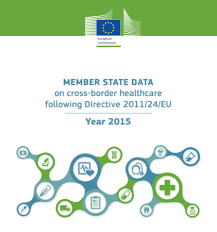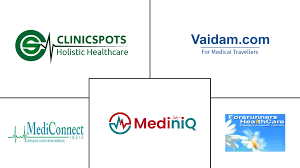
Navigating the World of Cross-Border Healthcare: A Guide to Global Medical Solutions
The Benefits of Cross-Border Healthcare
Cross-border healthcare, also known as medical tourism, is a growing trend that offers patients access to quality medical treatments and procedures in different countries. This practice has gained popularity due to several key benefits:
Cost-Effectiveness
One of the main advantages of cross-border healthcare is cost-effectiveness. Patients can often receive high-quality medical care at a fraction of the cost compared to their home country. This can include procedures such as surgeries, dental treatments, and wellness services.
Access to Specialized Treatments
Cross-border healthcare allows patients to access specialized treatments and procedures that may not be available in their home country. This opens up opportunities for individuals seeking cutting-edge medical care or alternative therapies.
Reduced Waiting Times
In many countries, the healthcare system may have long waiting times for certain treatments or surgeries. Cross-border healthcare enables patients to bypass these delays and receive prompt medical attention, leading to faster recovery and improved outcomes.
Quality Care from Accredited Providers
Patients opting for cross-border healthcare can choose from a network of accredited hospitals, clinics, and healthcare providers known for their high standards of care. These facilities often adhere to international quality standards and offer state-of-the-art medical technologies.
Cultural Experience and Travel Opportunities
In addition to receiving medical treatment, patients can also enjoy a cultural experience and explore new destinations while undergoing healthcare abroad. This combination of healthcare and travel can contribute to a holistic healing experience.
In Conclusion,
Cross-border healthcare presents a range of benefits for patients seeking quality medical care beyond their borders. With cost-effective options, access to specialized treatments, reduced waiting times, quality care from accredited providers, and the opportunity for cultural experiences, this practice continues to offer valuable opportunities for individuals looking to prioritize their health and well-being.
8 Essential Tips for Managing Your Health Care Needs When Traveling Abroad
- Research the healthcare system of the country you are visiting.
- Check if your health insurance covers medical expenses abroad.
- Carry important medical documents and emergency contact information with you.
- Understand any language barriers that may affect your healthcare interactions.
- Be aware of any cultural differences that could impact your treatment.
- Make sure to have access to necessary medications during your trip.
- Find out how to seek medical assistance in case of an emergency while abroad.
- Consider purchasing travel health insurance for additional coverage.
Research the healthcare system of the country you are visiting.
Before embarking on a cross-border healthcare journey, it is crucial to thoroughly research the healthcare system of the country you plan to visit. Understanding the local healthcare infrastructure, regulations, and quality standards can help you make informed decisions about where to seek treatment and ensure that you receive safe and effective care. By familiarizing yourself with the healthcare system of the destination country, you can better navigate the medical landscape and have peace of mind knowing that you are in capable hands.
Check if your health insurance covers medical expenses abroad.
Before embarking on cross-border healthcare, it is essential to check if your health insurance covers medical expenses abroad. Understanding the extent of your coverage can help you make informed decisions about seeking treatment in another country. Some insurance policies may offer partial or full coverage for international medical treatments, while others may require additional travel insurance for comprehensive protection. By verifying your health insurance policy in advance, you can ensure financial security and peace of mind during your healthcare journey abroad.
Carry important medical documents and emergency contact information with you.
When engaging in cross-border healthcare, it is crucial to carry important medical documents and emergency contact information with you at all times. These documents, such as medical history, prescriptions, and insurance details, can provide vital information to healthcare providers in case of emergencies or unexpected medical needs. Having readily accessible emergency contact information ensures that loved ones can be notified promptly in urgent situations, facilitating a swift and coordinated response to any healthcare challenges that may arise during your travels for medical treatment.
Understand any language barriers that may affect your healthcare interactions.
Understanding any language barriers that may affect your healthcare interactions is crucial when considering cross-border healthcare. Effective communication between patients and healthcare providers is essential for accurate diagnosis, treatment, and overall care. Being aware of potential language barriers allows patients to proactively address translation needs, whether through interpreter services, multilingual staff, or other communication tools. By overcoming language obstacles, patients can ensure that their healthcare experience is smooth, comprehensive, and tailored to their specific needs.
Be aware of any cultural differences that could impact your treatment.
When considering cross-border healthcare, it is crucial to be mindful of any cultural differences that could potentially influence your treatment experience. Cultural nuances can play a significant role in healthcare practices, communication styles, and patient-provider relationships. Being aware of these differences can help you navigate the treatment process more effectively and ensure that your healthcare needs are met in a manner that aligns with your cultural preferences and expectations. By proactively addressing cultural considerations, you can enhance the quality of care received during your cross-border healthcare journey.
Make sure to have access to necessary medications during your trip.
When engaging in cross-border healthcare, it is crucial to ensure that you have access to necessary medications throughout your trip. Prior to traveling for medical treatment, make a comprehensive list of your prescribed medications and ensure you have an ample supply to last the duration of your stay abroad. Additionally, consider obtaining any required medical prescriptions or documentation from your healthcare provider to facilitate the procurement of medications in a foreign country. By proactively planning for medication needs, you can prioritize your health and well-being while undergoing treatment away from home.
Find out how to seek medical assistance in case of an emergency while abroad.
When engaging in cross-border healthcare, it is crucial to be prepared for unforeseen circumstances, such as medical emergencies. To ensure your safety and well-being while abroad, it is essential to familiarize yourself with the local emergency services and healthcare facilities in the country you are visiting. Researching how to seek medical assistance in case of an emergency, including knowing emergency contact numbers, nearby hospitals or clinics, and any language barriers that may exist, can help you navigate unexpected situations with confidence and prompt access to necessary care. Being proactive and informed about emergency protocols can provide peace of mind and ensure a swift response in times of urgent medical need during your international healthcare journey.
Consider purchasing travel health insurance for additional coverage.
When exploring cross-border healthcare options, it is advisable to consider purchasing travel health insurance to supplement your coverage. Travel health insurance can provide additional financial protection in the event of unexpected medical expenses, travel-related emergencies, or complications during your healthcare journey abroad. This extra layer of coverage can offer peace of mind and ensure that you are adequately prepared for any unforeseen circumstances while seeking medical treatment in a different country.


